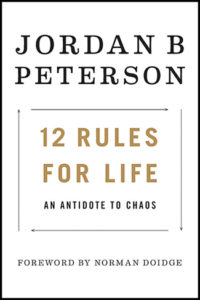Not to be confused with the 12 steps, but read on.
Two posts ago I said I’d suggest practical applications for some of Jordan Peterson’s self-help recommendations, as they might apply to people struggling with addiction. I hesitate to put Peterson’s  name in the title of this post, as there has been such a fantastic degree of controversy surrounding this man.
name in the title of this post, as there has been such a fantastic degree of controversy surrounding this man.
Many thousands have thanked him for live-saving advice, women as well as men. Many love him, I’d say for good reasons. And many hate him. Despite my admiration for most of Peterson’s proposals, I also find myself turned off by some of the things he says in public. These seem careless, absent-minded, maybe provocative,  sometimes angry, but certainly not intended to harm vulnerable individuals. But again, I want to avoid the political shit storm. It just doesn’t interest me as much as the content of Peterson’s proposals and their capacity to help those in need.
sometimes angry, but certainly not intended to harm vulnerable individuals. But again, I want to avoid the political shit storm. It just doesn’t interest me as much as the content of Peterson’s proposals and their capacity to help those in need.
The first recommendation I want to explore is the theme of taking small, manageable steps out of addiction. To paraphrase from my previous post:
People in addiction often want to make a massive change in their lives, but the change is so massive that it overwhelms their capacity for self-direction. So they fail, again and again.
As noted previously, Peterson’s approach to the problem comes to the surface in this talk, about 33 minutes in:
You need a goal, but we don’t want your distance from the goal to crush you…Set a high aim, but differentiate it down so you know what the next step is. And then make the next step difficult enough so that you have to push yourself past where you are, but also provide yourself with a reasonable probability of success.
Nothing particularly new about this idea? Except that Peterson urges a balance between idealized progress and the capacity to succeed even minimally. People in addiction know the price of repeated failures. Each time we set a goal (e.g., never again, not tonight, not this weekend, not shooting it, stopping after two drinks,  sticking to wine) and fail to follow through, there’s a dash of salt in the already-gaping wound to our self-respect. More evidence for that critical inner voice (which I’ll get to next post) and confirmation of the belief that we’ll never succeed or we’re not worth the effort (and pain) of repeated attempts.
sticking to wine) and fail to follow through, there’s a dash of salt in the already-gaping wound to our self-respect. More evidence for that critical inner voice (which I’ll get to next post) and confirmation of the belief that we’ll never succeed or we’re not worth the effort (and pain) of repeated attempts.
These outcomes are both familiar and devastating. When I was taking drugs, each and every time I promised myself to stop — and didn’t — deepened the pit of hopelessness and self-contempt. Stopping was just too difficult…at first. “Never again” felt like being cast on the shore of a desert island, naked, alone, and lacking the one source of safety I could have brought with me.
Little steps — cutting down, controlled use — will be far more manageable for most people in active addiction. Call it harm reduction, if you like, because it certainly reduces harm. But, as Peterson emphasizes, this isn’t a rationale for falling short of  complete success. Getting your life exactly where you want it to be is possible, in fact necessary, but it might not be possible this week. So, he advises, be really practical, identify a goal that’s in reach. And make sure you stick to it. If your house is a veritable pig sty, set yourself the goal of gathering the laundry off the bedroom floor — just that — and tomorrow you’ll feel capable of tackling the sock drawer.
complete success. Getting your life exactly where you want it to be is possible, in fact necessary, but it might not be possible this week. So, he advises, be really practical, identify a goal that’s in reach. And make sure you stick to it. If your house is a veritable pig sty, set yourself the goal of gathering the laundry off the bedroom floor — just that — and tomorrow you’ll feel capable of tackling the sock drawer.
One of my clients is a man I’ll call Jason, a sixty-plus year-old who lives in a large European city, having left his home in the U.S. more than twenty years ago. We have a psychotherapy session usually  once a week via live chat on the net. Jason would score a gram of heroin almost every Friday afternoon, because the weekend stretching out ahead of him felt like a wasteland of boredom and loneliness. When he got home from work Friday he’d get high. Then he’d use the rest on Saturday. There might be enough for a small hit on Sunday, but by then things were already looking pretty grim. Every Monday came the crashing depression of going without, compounded by exhaustion (not sleeping well) and savage self-recrimination. This generally went on until Wednesday morning.
once a week via live chat on the net. Jason would score a gram of heroin almost every Friday afternoon, because the weekend stretching out ahead of him felt like a wasteland of boredom and loneliness. When he got home from work Friday he’d get high. Then he’d use the rest on Saturday. There might be enough for a small hit on Sunday, but by then things were already looking pretty grim. Every Monday came the crashing depression of going without, compounded by exhaustion (not sleeping well) and savage self-recrimination. This generally went on until Wednesday morning.
The habit was entrenched. He did this every week. The emotional vulnerability, combined with habit strength, sunk him every Friday. So we set a goal that he felt he could manage. This week, just this  week, he was to make a plan to go out with a friend on Friday evening. I helped by calling him Friday morning to make sure he was on track. By Friday at dinnertime his dealer was off duty. All he had to do was to make it till then.
week, he was to make a plan to go out with a friend on Friday evening. I helped by calling him Friday morning to make sure he was on track. By Friday at dinnertime his dealer was off duty. All he had to do was to make it till then.
We did not try to resolve whether he would use later that weekend, or the following week. He’d cross that bridge when he came to it. (The one-day-at-a-time idea is certainly familiar in the 12-step world, though it comes with spring-loaded rebuke for failing.)
 This goal was in range. It was possible. And he succeeded. Saturday happened to be a sunny day and he spent it well. By Sunday there was no intense longing. Tomorrow would be a workday. Work organized Jason’s life. He wouldn’t feel tempted to use again until next Friday.
This goal was in range. It was possible. And he succeeded. Saturday happened to be a sunny day and he spent it well. By Sunday there was no intense longing. Tomorrow would be a workday. Work organized Jason’s life. He wouldn’t feel tempted to use again until next Friday.
A good start.
Obviously this isn’t rocket science. But it is powerful. Jason felt good about himself. By Sunday, and through the week, his mood was brighter than it had been in months. And he had the beginnings of a defense, a bulwark, against the self-denigrating voice that made him feel like shit most of the time.
As Peterson recognizes, as any good psychologist practicing CBT ought to know, small changes build momentum, allowing for a lot more progress than can be envisioned from Square One.
……………..
Check out this cute Medium post showing how small changes to bad habits can generate a chain reaction. Just as good habits lead to the strengthening of additional good habits, indulging in addictive acts leads to more addictive acts. It’s that simple.
I find it impossible to reflect on these cognitive calculations without considering the internal dialogue. See next post.
………………….
By the way, here is a positive and constructive website/blog from a recovered heroin addict — now a neuroscientist. No, not a cousin.

Leave a Reply